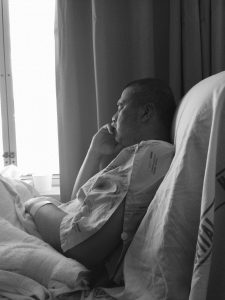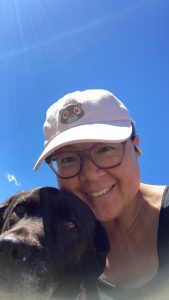When Faced With Unrelenting Pain, There Are No Heroes

In his book “1984,” George Orwell wrote, “Of pain you could wish only one thing: that it should stop. Nothing in the world was so bad as physical pain. In the face of pain there are no heroes.”
I pondered writing about this subject for a long time because I see physical pain every day as a caregiver to my husband, Aubrey, who is afflicted with hereditary ATTR amyloidosis. Aubrey was diagnosed in 2013 and went through the anguish of a liver transplant in 2016.
Since then, the pain of so much amyloid protein depositing in and around his nerve fibers has only become stronger, and it now lingers longer. His feet always feel like they are on fire, and the shooting pains that run up his hands and legs are crippling.
I have asked Aubrey to describe what this type of pain feels like, but his answers are not always very insightful. The only way he can articulate the agony he feels is that it’s akin to rolling on a bed of needles while someone is setting his feet on fire. Day in and day out, this is how he feels. The pain barometer may go higher or lower, but it never drops to zero.
If you are an amyloidosis sufferer, I hope this reminder of your pain does not exacerbate it. I only share this to let you know that there is no shame in admitting the utter discomfort you experience. My husband took his pain in stride for a very long time before he admitted defeat. Wanting to conquer the torment made him irritable, fragile, and resentful of the physical limitations he increasingly faced.
He tried to be a hero and roll with the punches, but the consequences of his efforts put everyone around him on edge. People instinctively want to help alleviate his discomfort, but the more we tried, the more he resisted. Finally, he couldn’t resist any longer and started taking neuropathic medication.
Carers like me must make many adjustments to support our loved ones, and I think the biggest challenge is placing their needs above our own. For example, my pain is not physical but emotional.
Trying to put myself in his situation and treat him how I would like to be treated is a great concept, but when it comes to caring for a rare disease patient, it’s not as clear-cut as it sounds. Firstly, I can’t imagine what it’s like being in his shoes. Secondly, with all of the complexity that the disease brings, there is no way I can anticipate how I would like to be treated. It becomes a roller coaster of emotions. If I’m not careful, it would be easy to detest Aubrey and not the disease.
Unfortunately, barring taking aspirin to manage stress headaches, there are no medications that will help us make things better again. However, there are actions that we as caregivers can take to recharge our inner batteries.
If you’re in a similar situation, find a friend to confide in, because talking helps. Take time out for yourself to do activities you enjoy. Rest is important, so avoid silencing that inner voice crying out for you to stop.
Lastly, realize that you matter and are loved. It can be lonely being a caregiver, but resist the lie that you are on your own. You are not alone. Remember that even heroes have sidekicks.
***
Note: FAP News Today is strictly a news and information website about the disease. It does not provide medical advice, diagnosis, or treatment. This content is not intended to be a substitute for professional medical advice, diagnosis, or treatment. Always seek the advice of your physician or other qualified health provider with any questions you may have regarding a medical condition. Never disregard professional medical advice or delay in seeking it because of something you have read on this website. The opinions expressed in this column are not those of FAP News Today or its parent company, Bionews, and are intended to spark discussion about issues pertaining to familial amyloid polyneuropathy.









Leave a comment
Fill in the required fields to post. Your email address will not be published.